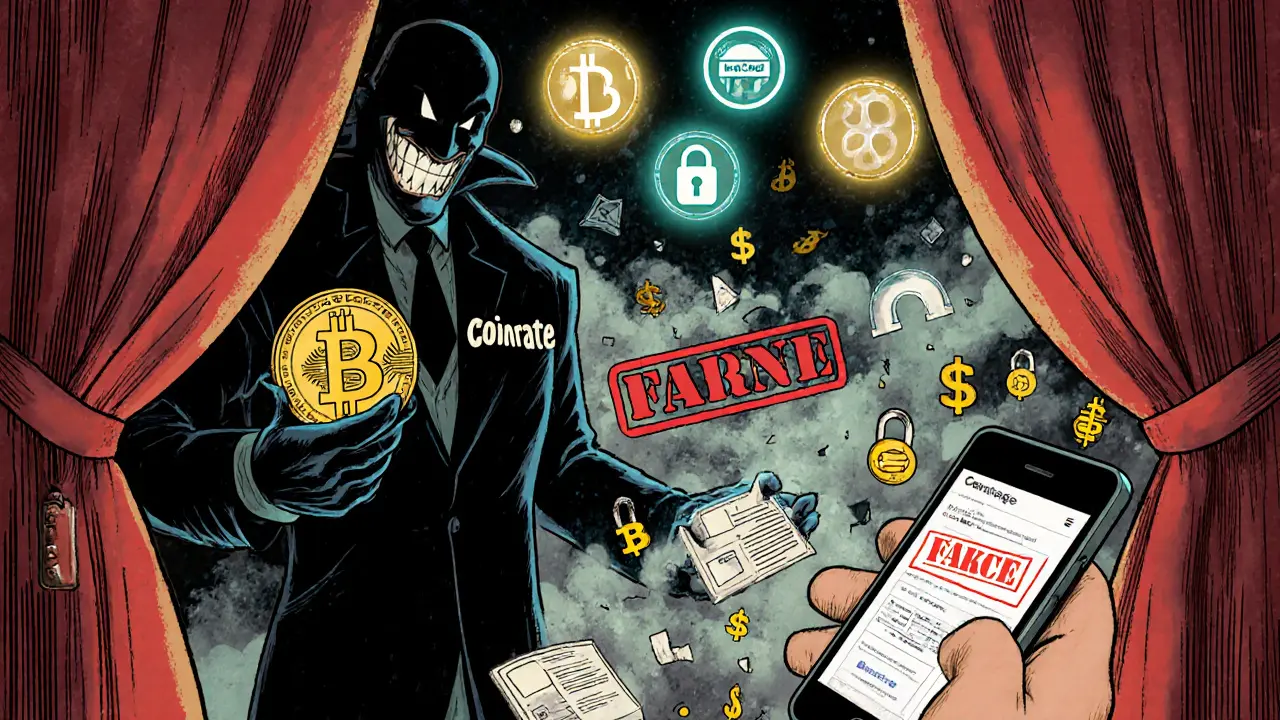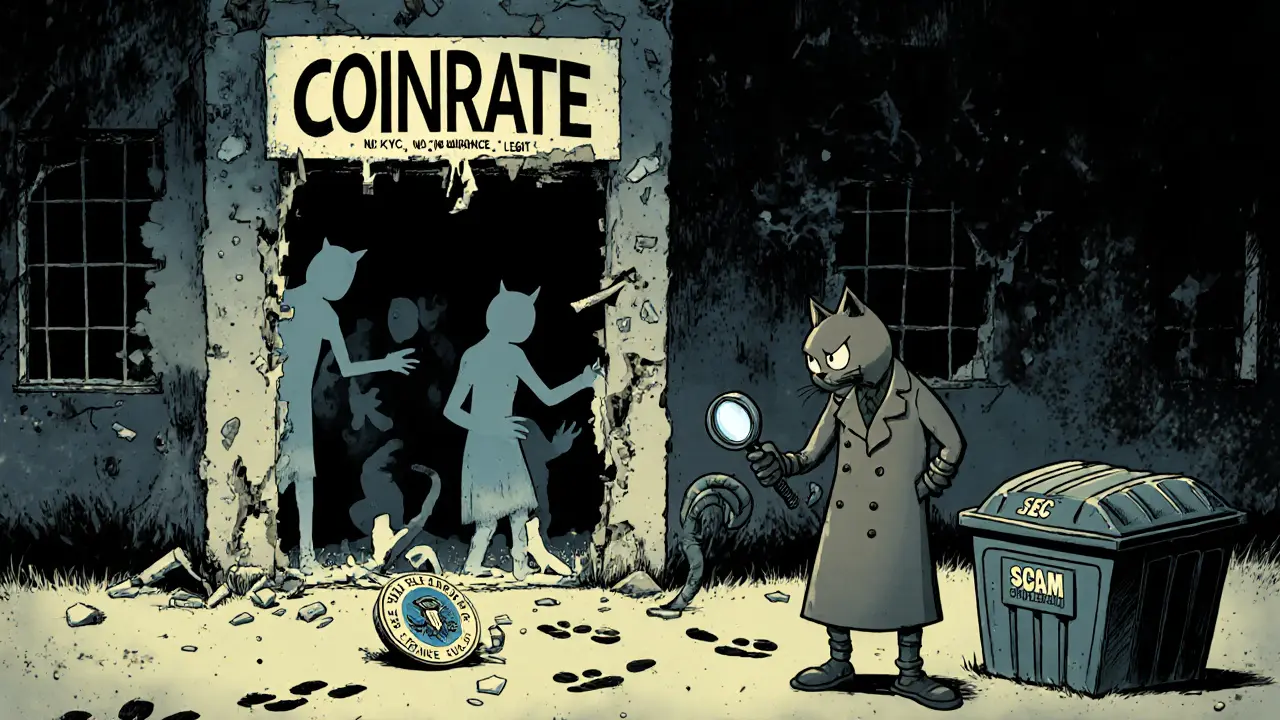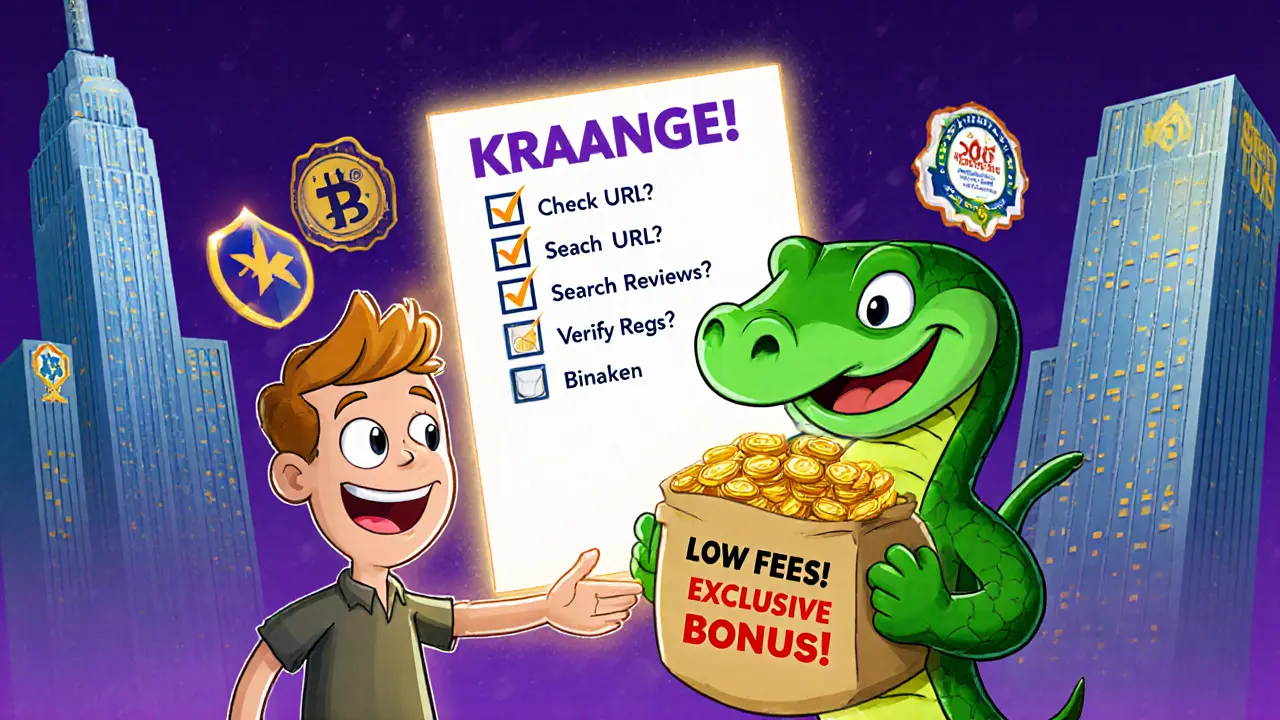Coinrate Crypto Exchange Review: Is It Legit or a Scam?

Nov, 13 2025
Crypto Exchange Scam Checker
Check if a cryptocurrency exchange is legitimate or potentially fraudulent. Enter an exchange name to verify its key security and regulatory indicators based on industry standards.
There’s no such thing as Coinrate as a legitimate cryptocurrency exchange. If you’ve come across a website or app called Coinrate claiming to let you buy, sell, or trade Bitcoin, Ethereum, or other coins, you’re likely looking at a scam.
Real crypto exchanges like Binance, Coinbase, and Kraken are transparent. They list their headquarters, publish security reports, show user reviews, and register with financial regulators. Coinrate does none of this. No official website. No customer support email. No verified social media accounts. No mention in any major crypto news outlet like CoinDesk or Cointelegraph. Not even a trace in CoinGecko or CoinMarketCap’s rankings of the top 100 exchanges.
Here’s what you should know if you’ve been tempted by Coinrate: legitimate exchanges don’t hide. They advertise their cold storage practices - like Coinbase keeping 97% of customer funds offline. They publish insurance coverage - Coinbase has $255 million in asset protection. They have clear fee structures - Binance charges as low as 0.02% for high-volume traders. Coinrate offers none of this. Not a single verifiable detail.
Why Coinrate Doesn’t Exist
The name Coinrate sounds like a mix of Coinbase and CoinRabbit - two real names in crypto. That’s not an accident. Scammers intentionally create names that look similar to trusted brands. It’s called typosquatting. You type Coinbase by mistake, and suddenly you’re on a fake site that looks almost identical. The goal? Get your login details, your private keys, or your money.
Security firms like Arkose Labs and Krayon Digital have documented how these fake exchanges operate. They often use cloned UIs from real platforms. They promise low fees or “exclusive bonuses.” They might even show fake trading volumes and user testimonials. But behind the curtain? No KYC. No AML checks. No regulatory compliance. That’s a red flag bigger than any green candlestick.
In 2024, over $2.38 billion was stolen from crypto users through phishing, fake exchanges, and rug pulls. The Financial Crimes Enforcement Network (FinCEN) reported that 78% of legitimate exchanges now follow full KYC/AML rules. Coinrate? Zero compliance. No registration with the SEC, FINMA, or any other global financial authority. If it can’t prove it’s legal, it’s not safe.
What Real Exchanges Do That Coinrate Can’t
Let’s compare what a real exchange offers versus what Coinrate can’t - because it doesn’t exist.
| Feature | Real Exchanges (e.g., Coinbase, Binance) | Coinrate |
|---|---|---|
| Regulatory Registration | Registered with FINMA, SEC, FCA, or similar | No registration found |
| Cold Storage | 95-98% of assets stored offline | Unknown - likely 0% |
| Insurance Coverage | Coinbase: $255M; Binance: $1B SAFU fund | No insurance policy |
| Two-Factor Authentication | Mandatory OTP, hardware keys, biometrics | Not available or disabled |
| Trading Volume | Binance: $76B/day (Q2 2024) | Zero recorded volume |
| User Reviews | 18K+ Trustpilot reviews for Coinbase | No reviews, no forum mentions |
| Support Channels | Email, live chat, help center | No contact info |
These aren’t just nice-to-haves. They’re survival tools. If a platform doesn’t use cold storage, your Bitcoin could vanish in a hack. If it doesn’t have insurance, you lose everything if they go under. If it doesn’t verify your identity, it’s not just risky - it’s illegal in most countries.

How to Spot a Fake Crypto Exchange
You don’t need to be a tech expert to avoid scams. Here’s a quick checklist:
- Check their website URL - Does it end in .com or .io? Is there a typo? Coinrate.com is not the same as Coinbase.com.
- Search for reviews - Type “Coinrate scam” or “Coinrate review Reddit.” If you get zero results, that’s the answer.
- Look for regulatory info - Legit exchanges list their licenses. Click on “Regulatory Compliance” or “Legal.” If it’s missing, walk away.
- Test withdrawal - Real exchanges let you withdraw small amounts first. Fake ones block withdrawals after you deposit.
- Check CoinGecko or CoinMarketCap - If it’s not listed there, it’s not real.
There’s a reason why the top 10 exchanges handle 95% of all crypto trading. They’ve earned trust through transparency, security, and years of operation. Scams like Coinrate thrive on speed and secrecy. They disappear as fast as they appear.
What to Do If You’ve Already Used Coinrate
If you sent money to Coinrate, act fast.
- Stop sending more funds - no matter what they say about “unlocking” your balance.
- Report the site to your local financial regulator - in New Zealand, that’s the Financial Markets Authority (FMA).
- File a report with Action Fraud (UK) or IC3 (US) if you’re in those regions.
- Change passwords on all related accounts - email, crypto wallets, banking.
- Warn others - post on Reddit, Twitter, or crypto forums so no one else gets trapped.
Recovering stolen crypto is nearly impossible. But stopping others from falling for the same scam? That’s something you can do.

Safe Alternatives to Coinrate
If you’re looking for a trustworthy exchange, stick with these:
- Coinbase - Best for beginners. Simple interface, FDIC-insured fiat wallets, and $255M insurance on crypto holdings.
- Binance - Best for traders. Low fees, 300+ coins, and a $1B SAFU fund for emergencies.
- Kraken - Best for security. 95% cold storage, transparent audits, and trusted by institutions.
- Bybit - Best for derivatives. Strong track record, regulated in multiple jurisdictions.
All of these have public financial statements, active support teams, and years of user history. You can find their security reports online. You can read thousands of real reviews. You can withdraw your money anytime.
Don’t risk your savings on a name that doesn’t exist. If it sounds too good to be true - or too similar to a real brand - it is.
Is Coinrate a real crypto exchange?
No, Coinrate is not a real crypto exchange. It does not appear on any major crypto data platforms like CoinGecko or CoinMarketCap. No official website, regulatory registration, security audits, or user reviews exist for Coinrate. It is likely a scam site designed to mimic legitimate exchanges like Coinbase.
Why can’t I find Coinrate on any crypto websites?
Because Coinrate doesn’t exist as a functioning platform. Legitimate exchanges are listed on industry databases, covered by news outlets like CoinDesk, and tracked by security researchers. Coinrate is absent from all of these because it has no infrastructure, no team, and no legal standing. Its absence is proof it’s not real.
Could Coinrate be a new exchange that just launched?
No. New exchanges are announced in major crypto media and listed on CoinGecko within days. No press release, no social media launch, no community buzz - nothing. Even smaller exchanges like Bitrue or Gate.io had clear launches with documentation. Coinrate has zero footprint. This is not a new player - it’s a ghost.
What should I do if I deposited money into Coinrate?
Stop all activity immediately. Do not send more funds. Report the site to your country’s financial regulator (e.g., FMA in New Zealand, FinCEN in the US). Change passwords on all linked accounts. File a report with IC3 or Action Fraud if applicable. Recovering funds is unlikely, but you can prevent others from being scammed by warning them.
Are there any legitimate exchanges with similar names?
Yes, but they’re not Coinrate. Coinbase is the most common one people confuse it with. CoinRabbit is another name that sounds similar but is also not a major exchange. Always double-check the spelling. The difference between Coinbase and Coinrate is just one letter - but that one letter could cost you everything.
Final Warning
Crypto scams are rising. In 2024, over 60% of all crypto fraud targeted users through fake exchanges and phishing sites. Coinrate is one of hundreds. It doesn’t need to be clever - it just needs to look real for five seconds. That’s all it takes.
Don’t gamble with your crypto. Use platforms with a proven track record. If you can’t verify it, don’t use it. Your money, your security, your peace of mind - none of that is worth the risk of a name you can’t find anywhere else.